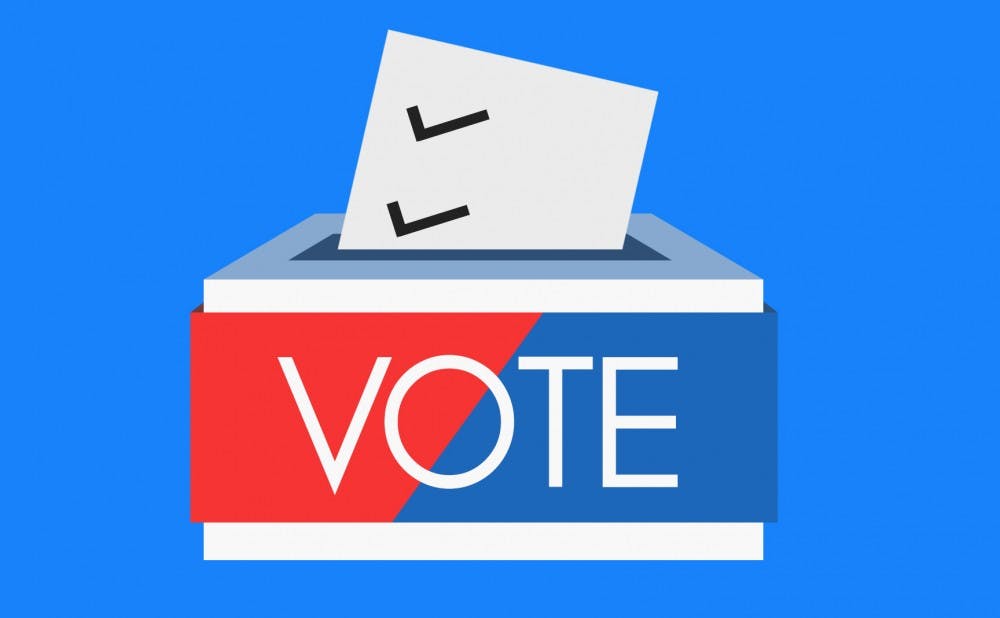The midterm elections are coming up, and 35 Senate seats, 39 governor’s positions, the entire House of Representatives and thousands of statewide offices are in play. So you might consider taking a study break, exercising your civic duty and helping put your least favorite congressman out of their job—or helping keep your favorite one in office.
When and where can I vote?
Election Day is Nov. 6, but you can skip the lines and vote early between Wednesday, Oct. 17, and Saturday, Nov. 3. This year, Duke will host an on-campus early voting site at the Brodhead Center in Room 068, next to Au Bon Pain.
If you miss early voting, however, you will have to vote at the same polling place on Election Day as everyone else—the George Watts Elementary School for East Campus residents, and the W.I. Patterson Recreation Center for those on West and Central Campuses or 300 Swift Avenue.
Do I have to be registered?
North Carolina requires registration for all voters, but you can register in person when you show up to vote early at the Brodhead Center, so long as you bring your DukeCard.
If you live off-campus, you will also need to bring a proof of residence—a North Carolina driver’s license, a current utility bill, a bank statement, a paycheck, a government check or any other government document showing your North Carolina address.
Who’s on the ballot?
Rep. G.K. Butterfield, the 14-year Democrat representing most of Durham County and other areas, is up for reelection this year. He will face Roger Allison, a Republican businessman.
In the North Carolina General Assembly, State Sen. Floyd McKissick and State Rep. MaryAnn Black, both Democrats, are running for reelection this year. Also on the ballot will be 13 judgeships, Durham County Sheriff and a clerkship, among other positions, for which many are uncontested races.
What are the constitutional amendments?
This year, you will have the special opportunity of filling in more bubbles by voting on six proposed amendments to the North Carolina constitution.
The constitutional referendums are as follows:
- Right to hunt and fish. The amendment would make hunting and fishing a constitutional right, and it would ban restrictions on those practices, unless they are to “promote wildlife conservation and management” or “preserve the future of hunting and fishing.” Opponents say the amendment is a ploy to increase Republican turnout.
- Rights for crime victims. The amendment would expand existing law to cover victims of all personal and property crimes, including crimes by minors.
- Income tax cap. The amendment would cap the income tax rate at a possible maximum of 7 percent—which is currently capped at 10 percent. Right now, the income tax in North Carolina is fixed at 5.499 percent.
- Photo ID to vote. The amendment would require voters to show a photo identification before voting. Supporters say it is a way to combat voter fraud, but opponents cite findings that voter fraud is virtually non-existent—and that such a requirement would make it harder for older and black people to vote.
- Judicial vacancies. The amendment would allow a “nonpartisan Judicial Merit Commission,” not the governor, to appoint judges when vacant seats arise. Critics say this is an attempt by the Republican legislature to strip powers from Gov. Roy Cooper, a Democrat, and the amendment is opposed by all five of North Carolina’s living former governors, including the most recent Republican Gov. Pat McCrory.
- Elections board. The amendment would take away the governor’s power to elect members to the state elections board, and give it to the leaders of the legislature. Republican lawmakers have tried to achieve this twice since Gov. Cooper took office, and both times it was ruled unconstitutional—the latest version was struck down Oct. 16—but a constitutional amendment would bypass those rulings.
How can I vote for my home state?
Each state has different deadlines for registering and voting. You will usually need to request an absentee ballot by mail, after which a state elections office will mail you back a blank ballot. You will then need to mail your vote back to your home state.
You can buy stamps on campus in the Duke Technology Center—located in the basement below the University Store in the Bryan Center—or at the automated kiosk in the basement of East Campus Marketplace.
Get The Chronicle straight to your inbox
Signup for our weekly newsletter. Cancel at any time.

